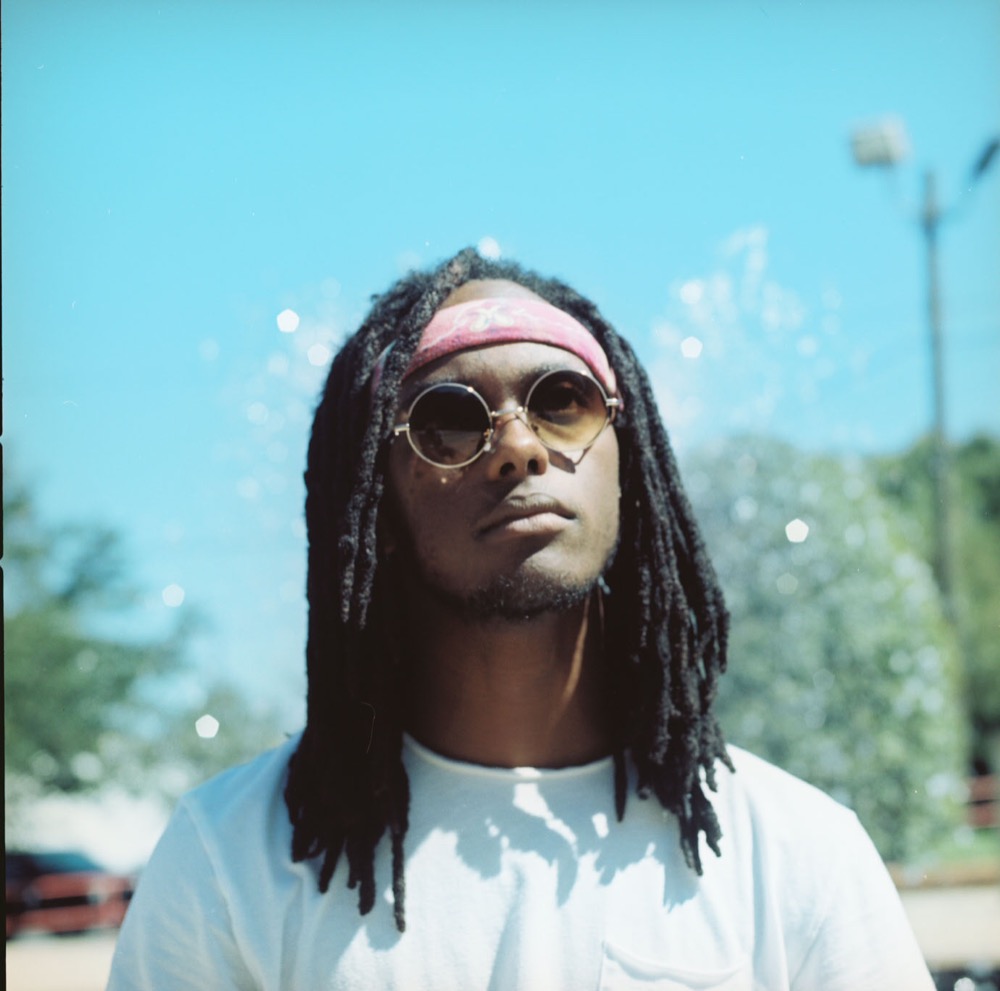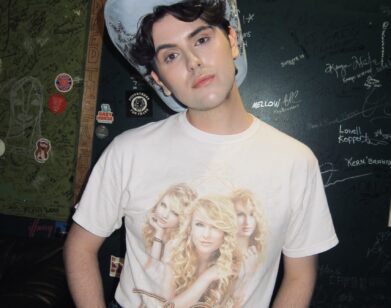Demo Taped and his grandfather talk civil rights, then and now
Adam Alexander may be young, but his roots run deep. Though the music he makes as Demo Taped sounds contemporary—the 19-year-old’s swooping electronics recall the avant-pop of Jai Paul and Flume—his R&B vocals pack a soulful punch, reflecting a youth spent performing in an Atlanta church. And not just any church—the Antioch Baptist Church North, an Atlanta landmark started by former slaves in 1877, whose pastor, Rev. Cameron Madison Alexander, happens to be his grandfather. Alexander was a close companion of Dr. Martin Luther King, and the two marched together in Atlanta during the Civil Rights Movement.
His grandfather’s experiences have impacted the younger Alexander’s own social conscience. “My ancestors fought for me and I will continue to fight,” wrote the younger Alexander on Twitter after the violence in Charlottesville earlier this year. “My grandfather and many others did not boycott lunch counters, march, and risk their lives and freedom to see this today. And we’re still here. We’re still fighting. We are Black and WE ARE PROUD…”
The relationship between the two Alexanders offers a snapshot of Atlanta’s beautiful activist tradition in action—as the specter of racism continues to haunt America, a new generation draw on their forebears for inspiration and guidance. Civil rights activism isn’t just historical; like the younger Alexander’s music, it changes to reflect new realities. But the message and tactics remain the same—belief in equality for all, achieved through non-violence.
EZRA MARCUS: Let’s start with you two telling me a little bit about yourselves.
ADAM ALEXANDER: I’m Adam, I go by Demo Taped and I make music. I’ve been making music since I was about seven years old.I took piano lessons really early on. My parents wanted me to play instruments and my dad was a bass player and he plays at the church that we go to. I’m sitting here with the pastor of the church right now, who’s also my Grandfather.
REV. CAMERON MADISON ALEXANDER: I’ve been a pastor for 64 years.
MARCUS: What are some of your first memories together?
REV. ALEXANDER: I remember when he was born. [laughs] He looked sort of funny, but I loved him anyways. When he was very, very, very young I was preaching from the Old Testament one Sunday about the biblical character named Adam, and I said in the sermon that Adam was very lonely. After the service Adam came to me—he was very small—he looked up to me and said, “Grandpa, Adam’s not lonely.” He thought I was talking about him. [laughs] That’s been a joke since he’s been born. Every time I see him, I say, “Adam’s not lonely!”
MARCUS: Adam, what are some of the ways your grandfather has been a mentor to you?
ALEXANDER: I’d say when I was going through my whole depression and anxiety. I remember one night coming to my grandfather’s and having a conversation about the whole thing, and at the time I was not in a good place at all. He told me a story about a man who was traveling and he went to someone else for assistance because he didn’t know where he was going. And he told the person that he was lost. And the man responded to him saying, “You’re not lost, you just don’t know where you are right now.” That story stuck with me and I still think about that because, whenever I’m feeling like everything is lost, I try to remember that. I’m not completely gone, you know?
MARCUS: Has he played a part in your musical development at all?
ALEXANDER: I think so, just through me coming to church. I think a lot of my live performance movements mimic some of the things he does when he’s preaching to call attention to the audience sometimes. I do mimic those things and I find myself doing that ’cause I’ve been watching it for years every Sunday. That’s something he has influenced a lot of my music on and the way I do things in the musical realm.
MARCUS: Rev. Alexander, I wanted to ask about your experience in the Civil Rights Movement.
REV. ALEXANDER: I’m 85 years old, so naturally I experienced a lot of history in America and what we call the Civil Rights Movement. I sometimes want to forget it but I can’t. I see reruns and it makes me feel very uneasy. When I think we’ve grown beyond what I experienced, and where we are now and what I see … It makes me a bit nervous. But I spent four years in the U.S. Air Force. I’ve been to foreign countries and I’ve always been proud of my country. The four years I gave my country, I would do it again if I had to. But I am a friend of Martin [Luther King]’s and Ralph [Abernathy]’s and we’ve been through a lot and I’m proud to have been in that army.
MARCUS: Adam, has your grandfather’s experience been an inspiration to you?
ALEXANDER: Obviously I have an emotional connection to everything that’s going on, one, because I’m black, but two, because he was a part of that time and history. I think when I see things that I see on TV like Charlottesville and Ferguson, I do think about my grandfather. I think about what he would’ve done and what those people fighting during the Civil Rights Movement would’ve done because I think that’s the only way to really move.
You can’t use these weird new tactics that don’t work, you know, violence and coming from this place of hate. I just don’t think it’s going to work and that’s all I’m seeing. So I’d say his involvement in that has helped me think about [these current events] a little differently. I find myself trying to think of ways to learn more about the Civil Rights Movement so I can better know how they did it back then because they made progress. I want to see progress now. So I’d say his involvement has changed the way that I think about the times that we’re going through today and also how I act in these times.
MARCUS: Rev. Alexander, when you look at the current political reality, do you have any advice for your grandson based on your experience, about the best way to go out and confront what’s going on?
REV. ALEXANDER: I am an adherent of non-violence. Violence has never been the way; the heart of man is goodness, and loving your neighbor, and getting the best out of everybody. I’m a heart person and I try to deal with people from my heart. I like to be dealt with in the same way. I think if there was goodness in the air that we can breath in, we’d have a better life for us as individuals and a better life in our world.
MARCUS: I wanted to ask, for either of you, how religion plays into your ideas about Civil Rights.
ALEXANDER: What I’ve learned from Christianity is to be open and accepting of all people regardless. That’s something I learned from my grandfather but I’ve also learned from reading the Bible—that’s my ultimate takeaway: love God and love yourself and love everybody else. We’re all on this planet for a very short amount of time. It isn’t ours. These bodies, they’re not ours. I really think that treating others with respect and love should just be something that we automatically do. It’s hard for me to understand true hate because my whole life I’ve seen a lot of love from my family. If you’re a true believer and if you’ve ever read the Bible, it makes no sense to hate someone else. They don’t go together.
REV. ALEXANDER: I believe that at some point we are going to have to give an account of how we lived on this Earth and it won’t be given to any man or any man-made position or any man-made institution. It’ll be about how I treated my fellow man, did I bring peace on earth, did I bring goodwill to men? My model is Jesus Christ. I’ve discovered in my life that if I modeled Him, if I follow Him, then I’ll be right. Because as I look around in this world everything tells me it’s about love and how God cares for us. The air we breathe is His because He loves us, and the water we drink is because He loves us, the end of the storm is because He loves us. So there’s no other way to live accept love, otherwise you put a period in your life before the chapters of it.
MARCUS: What do you think of your grandson’s music?
REV. ALEXANDER: I, well, as long as he’s playing in church. In the beginning I thought very [highly] of his music. Then he started venturing off into the kind of music that was hard for me to listen to. What I did understand was the lyrics, the words, the message. I’m an old-fashioned jazz musician and back then that’s what I thought I was going to do with my life. But the Lord didn’t see it that way and He called me to preach. So I love music, and I am thrilled that Adam has caught on to that divine spirit that puts him in tune with music that’s in the air and the heart and I’m listening to it more. I asked him, “Well do we dance off this? What are we supposed to do?” But I love the gospel influence that I hear in the message and in the music. The hope, the try again and keep trying. I think that music gives us a sense of security.
MARCUS: Adam, I was wondering if you could talk a little more about that gospel influence?
ALEXANDER: When it really comes down to it, I wanted to make a track that my grandfather actually could sit and listen to and have it be not too far off musically from what I do but also bring some of my 19 years on this Earth into it. Those 19 years have been full of going to church and listening to gospel music and playing gospel music and singing gospel music. I’ve been thinking about it for a while, after I released my first EP, I really wanted to do one song that had a gospel feel at least. So that I could play it for my grandfather and it would be something that he could identify with and I think it was important to, bridge a gap. I want everyone to be able to identify with one of my songs by the end of this.
REV. ALEXANDER: Truth be told, I asked him when he first started, when are you going to do a gospel song? When are you going to do a church song? He was brought up in the church and played in the church, so I said you don’t need to cut the past! Let me hear something! And each time he would tell me about going out of town and working in the studio I would say, “Well what are you doing with the Gospel song?!” [laughs] I’m glad that he did this because it’s in his DNA and you gotta pull that out. I really took time to listen to the music and the message and I enjoyed it. I think it’s gonna do a lot of good for a lot of people. But that was my request. Really, the title could’ve been “My Request.” [laughs]
MARCUS: I wanted each of you to say one memory that really defines the other one for you.
REV. ALEXANDER: I think what helps me as I experience Adam, and his life and his growth and his gift, is that God is still giving to him. He’s not out of miracles and he gave Adam one—that’s music. Adam recognizes [that] and now he’s using it. It’s beneficial to the extent that others want to hear and be helped by it. I think in life, a granddaddy likes to see that their [grandson is] living their gifts. They’re living their talent, and being helped by it and helping people by it. I think that’s the word in life to live.
ALEXANDER: Growing up around my grandfather has helped me to have a different definition of what it meant to be a man than most of the outside world has. When people say, “Man up,” or “Men don’t cry,” and stuff like that, I think being around my grandfather shows that, being a man isn’t about being macho. It’s much more important than that. He’s shown me what it means to provide for your family and what the definition of family really is. He taught me about unconditional love and the importance of communication. We had a lot of talks at church and there are so many memories I could point to and cite, but I think it’s more about how he taught me to be as a person, I think that’s the most important gift that anyone could ever give.







